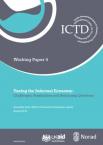ICTD Working Paper 37
It is now widely believed that taxation contributes to the quality of governance. There are a number of variants of the broad argument. The most general proposition is that, if governments are dependent on broad general taxation for their incomes, they will, for reasons of self-interest, be more responsive to the needs of their citizens and more likely to allow citizen representatives to share in governance. From a broad historical perspective, that argument is probably valid. The political interactions between states and citizens over tax revenues are however considerably more complicated than this. Governments can proactively use their control over the revenue collection process to divide their citizens into different, competing groups, and thereby increase governments’ own bargaining power relative to their taxpayers. This dimension of the politics of taxation systems has received relatively little attention in the substantial literature on the topic. This paper summarises and illustrates the ways in which governments can use patterns of public spending and tax exemptions to protect themselves from the potential political influence of organised taxpayers.
* This paper was originally published in Anne Mette Kjaer, Lars Buur and Lars Engberg-Pedersen (eds)
Perspectives on Politics, Production and Public Administration in Africa
Danish Institute of International Studies, 2015

